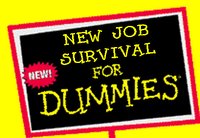Survivial Guide: New Job
It has been almost a month in my new job and I seem to be settling in rather quickly. Various factors may have made this possible and here I try to unravel what these factors may be. Again I don't profess this is THE ULTIMATE guide but this is just simply a self reflection of what has helped me to settle into my job relatively quickly.
- Knowing What MOTIVATES You
I think that it is essential that before one can really love a job, he/she really needs to know what he/she is looking for in a job; knowing what would make a person say: "Yes, this is the job for me!" How do you love a job when you don't even know what pushes you?
For me, it becomes clear that a job will motivate me if I am trusted and given the autonomy to be as creative as possible, if I get a sense of achievement being able to understand the system as well as establish systems for my own work processes, if my work is being appreciated (no need for tangible recognition but at least appreciation of the value of the work), if I can respect my superior and can see where he/she is leading the team, and if I am in a family-like working culture (with little or most ideally no politics). - Knowing your JOB
In order to settle into a job, you will of course need to know the job description (J.D.) which is a reflection of your organization's expectations of you as a worker and the skills set needed to achieve the desired outcome. Since you will also report to superior(s), it is also important to find out these superiors' expectations of you in your job (you do not have to explicitly ask them about it). Going a step further, expectations form visions and it is also good to know where people foresee your job, department or organization is going to e.g. they may see your portfolio as being critical to the growth of the organization and may even set up a department in the future. - Knowing your ORGANIZATION
You need to have a good understanding of the organization; its mission, its vision, its business, its history and its structure.
Knowing the history of the organization would give you vital clues about the path the organization have taken to get to where it is today and from this you can tell the business ethos of the people in charge as well as areas that you may have to pay more attention to or even avoid e.g. taboo topics etc.
Knowing the mission, vision, structure and business would give you a better idea where you stand in the scheme of things. Of vital importance is the communication and decision-making structure, so you know who to turn to for what and avoid stepping on peoples' toes unnecessarily - Knowing the POSITION'S TRACK RECORD
Spend some time to read through old documentation and files to have a brief understanding of what was done by the person before (if the person is still in the organization, try to make an appointment to meet the person to find out more about the job and its challenges etc). Reading about the track record will give you an idea of what has been done, how it has been done, what is permissible to be done and what is not, what some of the resources are. It would be a blessing if the person before left with a proper documentation system. All these would help you understand and settle into your job faster. Lastly, you will most probably have a lot of crazy ideas (both new ideas as well as those inspired by research on what is done outside your organization), jot these down as these "gut feelings" are usually quite accurate and you never will know when you will use them. Most of the time, as we become more settled into a job, we become less willing to take risk and become less creative. It is at times like these that you can take your ideas out for "revival". From here, you will also know what some of the immediate tasks and projects that you have to undertake. - Knowing the PEOPLE
People form your working environment and it is important you know especially the people who you will be working with. You also need to take note of the culture of people; what drives a group of people and what drives a group of people mad. Usually different departments will have different culture and it is important you find out about these cultures also to avoid stepping on people's toes unnecessarily. - Knowing WORK PROCESSES
Spend some time to look into how a job is being done by reviewing job workflows. If none exist, try to draw one out (especially if you are a visual person) and try to see how things can be done better. You might want to do some workflow review later on to better the way things are being done. You will also need to know protocols e.g. how to request for stationery, how to apply for leave, how to apply for training, how to make photocopy, how to make claims etc
[Hint: Your work processes should enable you to handover your job with ease when you leave your job i.e. all the filing, documents, procedures are well documented. Let's face it, being diligent in your work processes helps you ensure work is done efficiently and effectively (thus making life easier for you) as well as helps the next person taking over from you with ease (and leaving a good "legacy" as well as a good reputation). Yes you are right, begin your work with the mentality that you will leave one day. As my friend told me: no one is indispensible in an organization.] - Knowing your TOOLS OF YOUR TRADE
The last part is getting acquainted with the tools of your trade that would help you do your work and these will include your PC, phone, website portals, forms etc. Make sure you know how to use them to help you make proper use of available resources to do your work efficiently and effectively.
- Establishing your WORK ROUTINE (NEW)
You will most probably have a lot of tasks to competing for your attention, some of which would be linked together, i.e. the completion of one task will be dependent on another. Take for example my job: In my job, I need to attend to public enquiries coming in through the phonecalls, emails and even walk-ins, managing volunteers e.g. interviewing, selecting, placing etc, monitor projects, check the news on the latest on volunteerism, attending meetings both in and outside of office as well as travelling to the centres to meet volunteers etc. As such, I needed a work routine to help me track my projects and work as well as manage my schedule so that I will not be in the wrong place at the wrong time.
As such a typical beginning of the day would be:
(1) Arrive at Office
(2) Check voice mail (for public enquiries)
(3) Scan the day's news for articles on volunteerism
(4) Checking my palmtop for today's to-do
(5) Checking my Lotus Notes and palmtop for today's events
(6) Checking email for follow-up work and public enquiries
(7) Checking my files for outstanding volunteer placements and projects
(8) Writing a checklist of items needed to be followed-up today (adding new items to it whenever necessary)
Then at the end of the day...
(1) Check voice mail (for public enquiries)
(2) Update Lotus Notes and palmtop (new to-do and events)
(3) Check Lotus Notes and palmtop for events needing attention in the next 3 days







0 Comments:
Post a Comment
<< Home